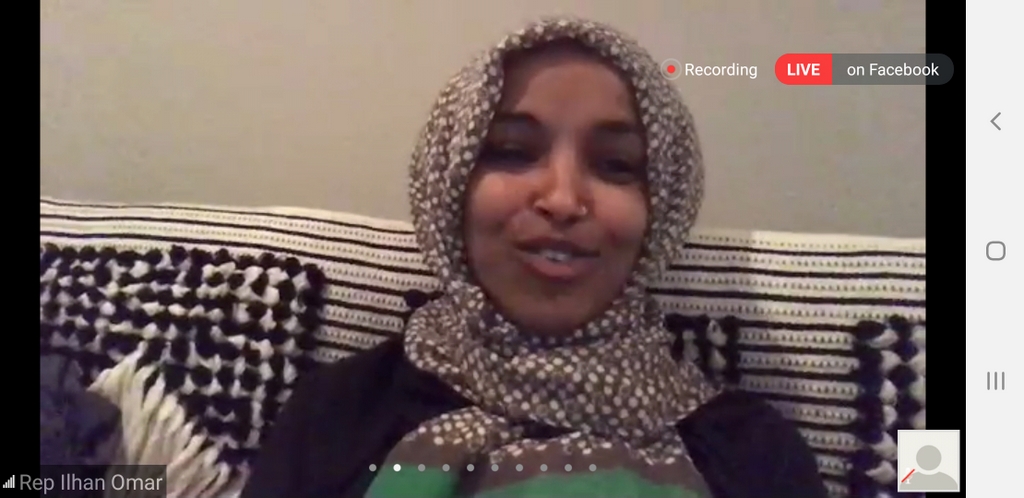[ad_1]
By J. K. Schmid
A Maryland grassroots organization is taking credit for stopping earlier versions of the COVID-19 relief bill passed Friday.
“It’s working!” Communities United, a member-led organizing network headquartered in Baltimore announced Tuesday. “Together, we blocked the horrific package of corporate giveaways.”
Criticisms of early drafts of the bill included the lack of funding and extensions for unemployment caused by the current and accelerating economic downturn, inadequate guarantees of K-12 access to school lunch programs as building shutter, and insufficient guarantees that corporate bailouts will not be diverted to executive pay.
Communities United didn’t do it alone. Working with similar organizations like Action Now, in Illinois, and the Center for Popular Democracy (CPD).

Ana Maria Archila, co-executive director of CPD moderated a teleconference call Tuesday evening, between activists and organizers and congresswomen Rep. Jan Schakowksy (D-IL) and Rep. Ilhan Omar (D-MN), to discuss demands on behalf of working Americans and what on the agenda remains unresolved.
“In a few days, rents are due, and mortgage payments are due.” Schackowsky said. “Although, we are looking to have moratoriums on people being evicted, and things like that. This is an incredibly, incredibly stressful time, and also, we’re separated from one and other, and that’s why this call, because it really does bring us together.”
President Donald J. Trump’s sweeping moratorium on foreclosures for mortgages guaranteed by Freddie Mac and Fannie Mae (over 90 percent of mortgages) and Federal Housing Administration loans was implemented a week ago. The issues of the remaining loans and renters have not been resolved at the federal level, leaving those Americans to negotiate with their lenders and landlords one on one.
While stimulus has not stopped layoffs, furloughs and suspension. Tangibles have been for some of America’s most vulnerable.
“As an advocate of child nutrition and making sure our kids are fed, in the last package, I worked with the Education and Labor Committee to make sure that my MEALS (Maintaining Essential Access to Lunch for Students) Act was included in the package that we passed,” Omar said. “It allows for the department to be able to have the free reign of whatever policies that they want to enforce to make sure that our kids have the meals that they need, even though they are not going to have the physical ability to be in schools to be fed.”
Perry Hopkins of Communities United addressed a too hidden crisis, the United States’s over two million prisoners and otherwise incarcerated.
“My brother is incarcerated, I’m in Baltimore, Maryland,” Hopkins said. “They took my brother in last week, he does have asthma, but they’re taking him into an environment where everybody’s shoulder-to-shoulder. What’s being done? The infection rate is already rising in jail, it’s just like being in school. Everybody’s spraying and touching everybody. I mean, there’s no coordinated effort. Nothing’s being done to decrease the risk to people who are right incarcerated be it temporary or long-term.”
Maryland prisons currently hold over 3,000 inmate over 50 years of age, and over 1,000 over 60 years of age, according to Justice Policy Initiative statistics.
“Being incarcerated is really a risk to your life at this point. He’s over 60. He’s over 60, okay?” Hopkins continued. “Y’know, regardless of what he’s been locked up for, it wasn’t anything heavy. But what’s going on, I’ve been trying to reach him, I can’t get any contact.”
“I think that we need to make sure that there is a moratorium on incarcerating people who are a low risk to their communities, and for us to make sure that we’re advocating for increased medical staff and making sure that there is an opportunity for people to have the resources that they need and to keep their environment for themselves and those who are around them,” Omar said.
“The kind of reports that we are getting about what’s happening to people who are incarcerated, to people who are in detention facilities, whether they are documented or undocumented, this is really delorable and it’s unbecoming of a country like ours.”
[ad_2]
Source link
